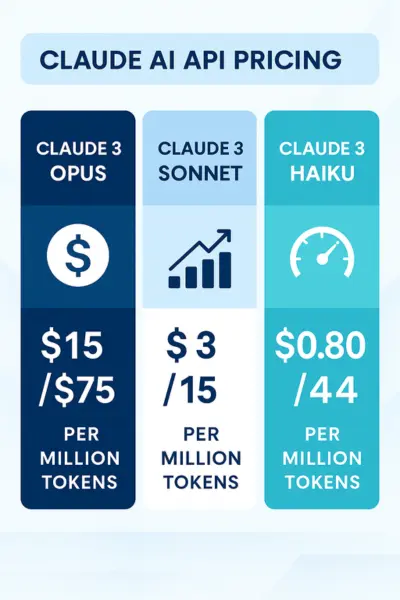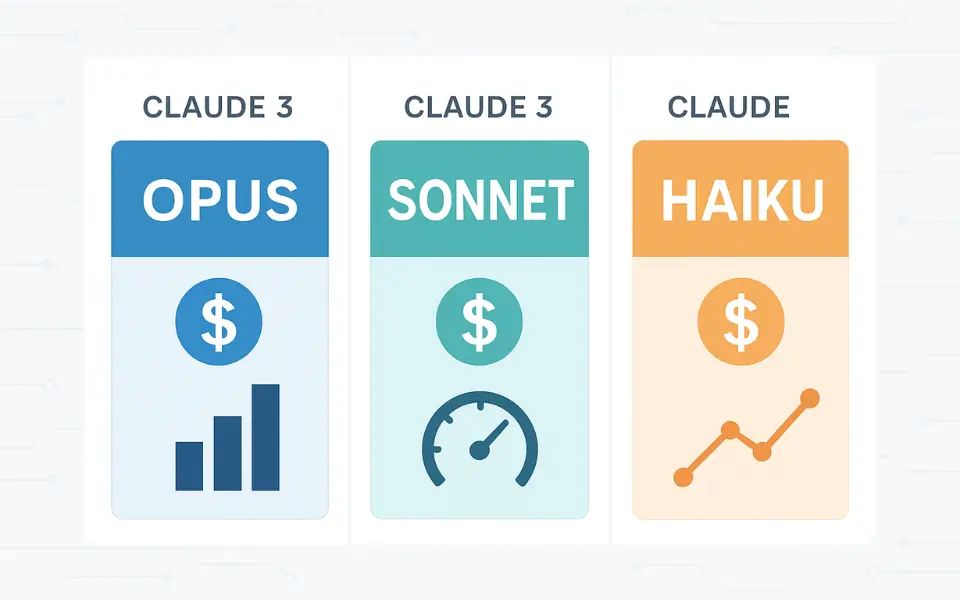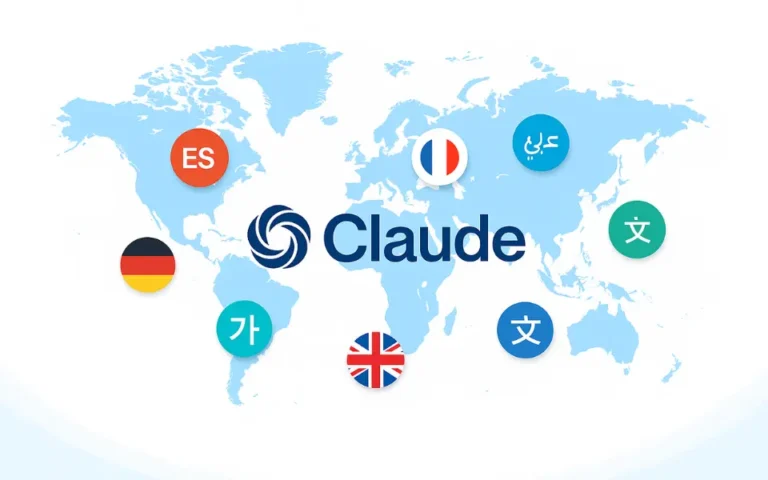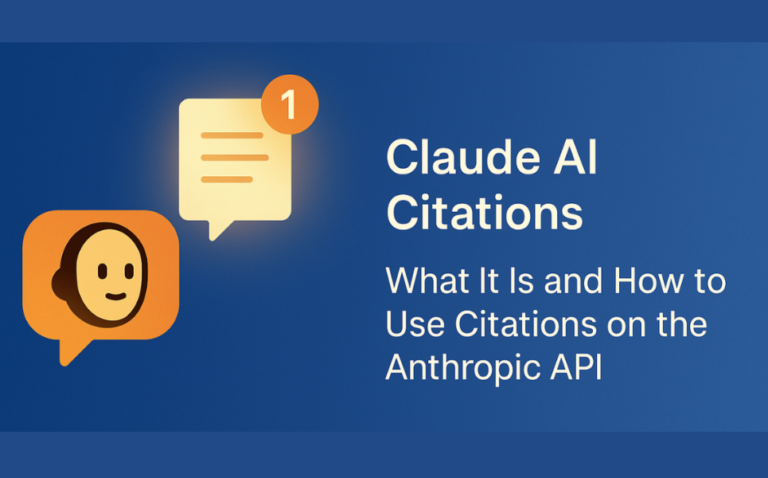Claude API Pricing: Complete Guide for Developers & Businesses
As AI continues to revolutionize software and automation in 2025, Anthropic Claude AI has emerged as a top-tier choice for developers, startups, and enterprises. One of the most frequent questions from businesses is: “How much does the Claude API cost?”
What Is Claude API?
The Claude API provides developers with programmatic access to Anthropic’s Claude family of large language models (LLMs). This API allows integration of advanced AI capabilities into various applications and systems through simple HTTP requests.
The API provides access to different Claude 3 models, including:
- Claude 3 Opus – Most powerful, deepest reasoning
- Claude 3 Sonnet – Balanced for speed and performance
- Claude 3 Haiku – Lightweight, ultra-fast model
Claude API Pricing (2025)

Anthropic offers a tiered pricing model for its Claude AI API, catering to various performance needs and budgets. The pricing is based on the number of tokens processed, with separate rates for input and output tokens.
Here’s a breakdown of the current rates:
- Model used (Opus, Sonnet, or Haiku)
- Tokens processed (input + output)
- Per-million-token cost
Here’s a breakdown of current pricing (as of Q2 2025):
| Model | Input Tokens | Output Tokens | Context Window | Best For |
|---|---|---|---|---|
| Claude 4.1 Opus | $15.00 / 1M | $75.00 / 1M | 200K tokens | Complex reasoning, architecture |
| Claude 4 Sonnet | $3.00 / 1M ($6.00 / 1M for prompts >200K) | $15.00 / 1M ($22.50 / 1M for prompts >200K) | 1M tokens* | Daily development, large codebases |
| Claude 3.5 Sonnet | $3.00 / 1M | $15.00 / 1M | 200K tokens | Cost-effective development |
| Claude 3.5 Haiku | $0.80 / 1M | $4.00 / 1M | 200K tokens | Simple tasks, high volume |
📌 Note: 1M tokens = roughly 750,000 words
Choosing the Right Model
- Claude 3.5 Sonnet: Ideal for applications requiring a balance between performance and cost, such as customer support bots and content generation.
- Claude 3.5 Haiku: Best for tasks needing rapid responses at a lower cost, like real-time data analysis and lightweight chatbots.
- Claude 3 Opus: Suited for complex tasks demanding high accuracy, such as legal document analysis and advanced research.
Example Cost Calculations
Example 1: Medium App Using Claude Sonnet
- 200K tokens per day (50K input, 150K output)
- Monthly usage: ~6M tokens
- Cost: ~$975/month
Example 2: Lightweight Bot Using Claude Haiku
- 50K tokens per day (real-time chatbot)
- Monthly usage: ~1.5M tokens
- Cost: ~$2.25 input + $18.75 output = ~$21
Example 3: Research Tool with Claude Opus
- 100K input, 100K output daily = ~6M tokens/month
- Cost: $900 input + $4,500 output = ~$5,400/month
Billing and API Access
- Platform: API access is provided via Anthropic developer portal and managed via API keys.
- Billing Cycle: Monthly usage-based billing
- Free Trial: No official free tier, but some platforms offer limited access to Claude via integrations
- Monitoring Tools: Includes usage dashboards and per-model tracking
Claude API vs OpenAI GPT API (Pricing Snapshot)
| Feature | Claude 3 Opus | GPT-4 Turbo (OpenAI) |
|---|---|---|
| Output Cost / 1M | $75.00 | ~$30.00 |
| Input Cost / 1M | $15.00 | ~$10.00 |
| Context Length | 200K tokens | 128K tokens (GPT-4 Turbo) |
| Transparency | High (Constitutional AI) | Moderate |
| Best For | Deep reasoning, E-E-A-T | Code, general productivity |
Verdict: OpenAI is cheaper, but Claude 3 Opus is preferred for tasks requiring precision, ethics, and long-context understanding.
Which Claude API Plan Should You Choose?
Choose based on:
- Your use case
- Latency needs
- Budget-conscious professionals
- Model accuracy and safety preferences
| Need | Recommended Model |
|---|---|
| Low-cost, high-speed responses | Claude 3 Haiku |
| General-purpose conversational AI | Claude 3 Sonnet |
| Advanced, deep AI reasoning | Claude 3 Opus |
Maximizing Value
To optimize costs:
- Utilize Batch Processing: Leverage the batch processing feature for large datasets to benefit from significant discounts.
- Monitor Token Usage: Keep track of your token consumption to manage expenses effectively.
- Select Appropriate Models: Choose the model that aligns with your specific use case to ensure cost-efficiency.
FAQs About Claude API Pricing
Conclusion: Is the Claude API Worth It?
Claude AI API pricing may appear premium especially with Opus but it delivers unmatched performance in ethics, reasoning, and long-context comprehension. For startups, Sonnet offers a strong middle ground. For real-time tools or bots, Haiku is an economical, lightning-fast solution.
Choose the model that aligns with your use case, scale, and technical needs, and Claude will likely exceed expectations.
Tip for Developers: Monitor your token usage actively to optimize cost-efficiency, and explore hybrid approaches using different Claude models across different workflows.







